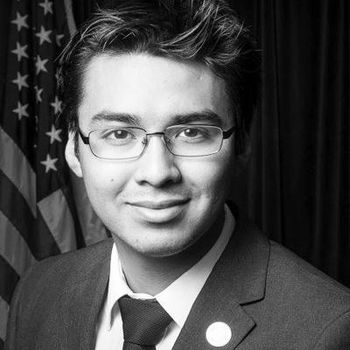OPINION: Free speech means defending language you don’t like
There is a renewed effort today by overzealous politicians who think they know better than everyone else to punish speech of which they disapprove. However, censorship is not the answer. To live in a truly free society means defending all speech, even that which you don’t like.
For the last six years, I have worked with college students around the country to fight for their freedom of expression on campus.
Earlier this month, a man was arrested for destroying a conservative group’s table in an incident that appeared to be politically charged. That is just one more example of hundreds of incidents I could cite where students have used force to silence speech.
But that same dangerous mentality extends to politicians, who want to use the power of the state to force people to comply.
For example, New York City recently banned the term “illegal alien,” meaning that someone caught saying it could now be fined of up to $250,000. And, last week, Massachusetts Democrat lawmaker Daniel Hunt’s bill that would ban the word “bitch” by imposing a fine of $150 or $200, or jail time of up to six months was debated in the state legislature.
Most recently, at the University of Connecticut, two students were arrested after uttering a racial slur.
[RELATED: UConn students ARRESTED for ‘ridiculing’ speech in viral video]
At first, it begins with a simple speech law that seems to be aimed at establishing common decency. But, before you know it, the government wants to regulate every conversation even if there is no intent to offend.
While I was in college, I had a nasty habit of cursing, something that came primarily from the types of people I hung around when I was a leftist.
Today, even though I find cursing and offensive slurs reprehensible, I understand laws that ban purely offensive speech threaten our democracy. However, this misguided censorship does have some support and is often referred to as the “Human Dignity Argument.”
Professor Jeremy Waldron from New York University makes an argument in support of these types of laws as he once wrote, “each person, each member of each group, should be able to go about his or her business, with the assurance that there will be no need to face hostility, violence, discrimination, or exclusion by other.”
The “B-word,” “F-word,” and by extension, any other racial or xenophobic term which aims to demean someone’s individuality, are offensive to me and any decent human being. However, it is dangerous to use the government to impose morality on others.
Immediately, these types of laws raise the question of enforcement. The only way to properly and thoroughly enforce laws like these is either through constant surveillance or a peer reporting system, which has a striking similarity to the type of ancient Puritan legal system.
Since the list of banned words would inevitably continue to grow to include whatever the government subjectively decides to ban, one could theoretically be charged without even knowing that certain words are off-limits.
[RELATED: POLL: Most young Americans support ‘hate speech’ exemption in First Amendment]
Take, for example, when a student was reported by his roommate simply for listening to a Ben Shapiro podcast. Even if he ultimately was found innocent of any wrongdoing, falsely accusing someone can be harmful to one’s mental well-being. A peer review system of this kind is open for abuse and mismanagement. Innocent people will be harmed as we have already seen happen with college campuses bias reporting systems.
The only sure way of effectively enforcing these types of laws is to have a government that intrudes in every aspect of people’s lives, to monitor people and charge them for committing crimes that often produce no real victim.
That’s not what freedom looks like. The consequences of censoring speech will always be more dangerous than any offensive word.
Supreme Court Justice Louis Brandeis had it right when he said “Sunlight is said to be the best of disinfectants; electric light the most efficient policeman.”
These words still hold true. The most effective way to confront offensive speech is with words of decency. More speech, not less, is the answer.
Follow the author of this article on Twitter: @OGNadales

